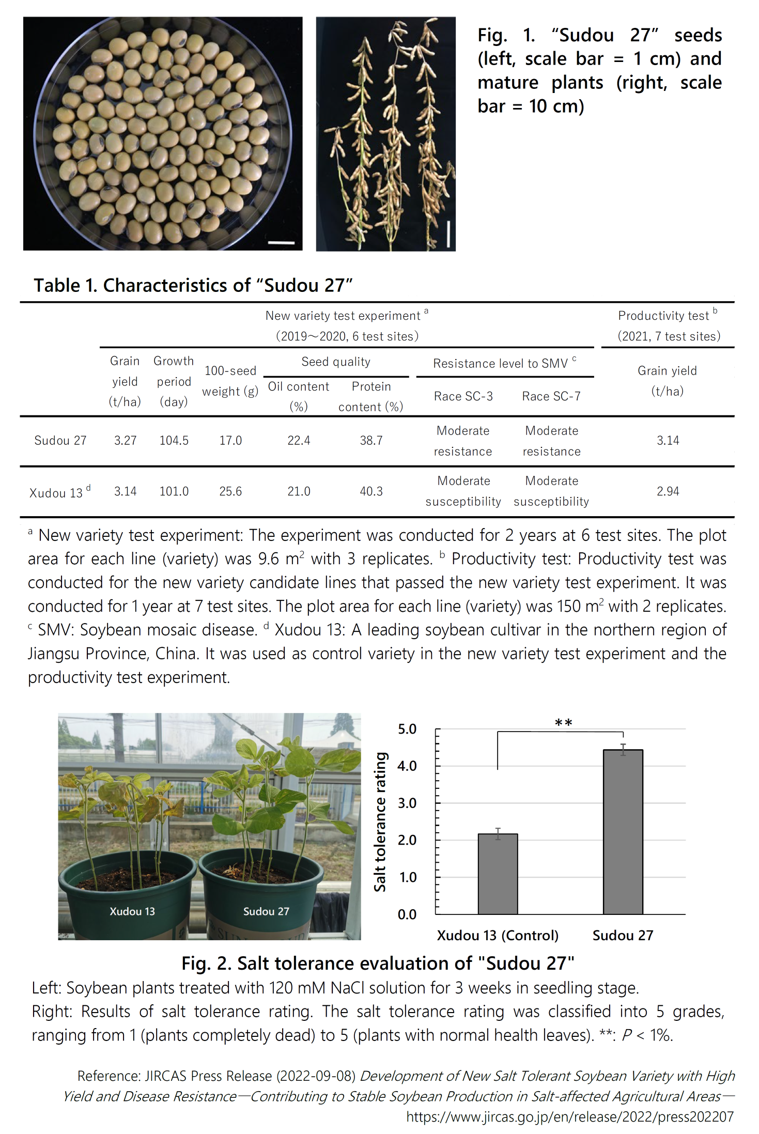Development of the new soybean variety "Sudou 27"
Description
Saline soils cover approximately 830 million hectares globally (FAO), with around 53% of this area located in Asia. Salinity problems lead to reduced crop productivity in these regions. Therefore, the development of crop varieties with high salt tolerance is necessary to adapt to saline soils. Previously, we identified the salt-tolerant gene Ncl from a Brazilian soybean variety and demonstrated that soybean lines carrying Ncl can maintain high seed yields in saline fields. Ncl is now being used in soybean breeding practices in China, Vietnam, and India. "Sudou 27," a new soybean variety, was developed in collaboration between the Jiangsu Academy of Agricultural Sciences, China, and the Japan International Research Institute for Agricultural Sciences, Japan.
"Sudou 27" (Fig. 1) was selected from the progenies of a cross between soybean lines 1138-2 and NILs72-T. NILs72-T harbors the salt tolerance gene Ncl. Based on three-year field evaluation results, "Sudou 27" was recognized for its excellent traits by the Crop New Variety Inquiry Committee of Jiangsu Province, China, and was registered as a new soybean variety in China on August 29, 2022. "Sudou 27" showed high seed yield and high seed quality characteristics, with a 6.9% higher seed yield (3.14 t/ha) and 1.4% higher seed oil content (22.4%) than the leading soybean cultivar in the northern region of Jiangsu Province, “Xudou 13,” which was used as control variety in the new variety test and productivity test experiments (Table 1). In a salt tolerance evaluation test conducted by treating the seedlings with 120 mM NaCl solution for three weeks, "Sudou 27" showed higher salt tolerance than "Xudou 13" (Fig. 2). In addition, "Sudou 27" exhibited moderate resistance to soybean mosaic disease caused by the soybean mosaic virus (SMV) (Table 1).
"Sudou 27" is expected to become one of the leading soybean varieties in the northern area of Jiangsu Province, China, replacing the former leading variety "Xudou 13." The successful development of this new variety using the salt tolerance gene Ncl has paved the way for breeding salt-tolerant varieties that are expected to contribute to the sustainability of soybean production in areas with salinity problems.
Figure, table
- Research project
- Program name
- Budget
-
交付金
- Term of research
-
FY2014–2022
- Responsible researcher
-
Xu Donghe ( Biological Resources and Post-harvest Division )
Chen Huatao ( Jiangsu Academy of Agricultural Sciences, P.R. China )
Cui Xiaoyan ( Jiangsu Academy of Agricultural Sciences, P.R. China )
Zhang Hongmei ( Jiangsu Academy of Agricultural Sciences, P.R. China )
Liu Xiaoqing ( Jiangsu Academy of Agricultural Sciences, P.R. China )
Wang Qiong ( Jiangsu Academy of Agricultural Sciences, P.R. China )
ORCID ID0000-0001-8843-7060Chen Xin ( Jiangsu Academy of Agricultural Sciences, P.R. China )
Gu Heping ( Jiangsu Academy of Agricultural Sciences, P.R. China )
- ほか
- Publication, etc.
-
(中国)主要農作物品種審査認定証「蘇審豆20220012」国際農研プレスリリース(2022):https://www.jircas.go.jp/ja/release/2022/press202207Do et al. (2016) Scientific Reports 6: 19147.https://doi.org/10.1038/srep19147
- Japanese PDF
-
2022_B03_ja.pdf1 MB
- English PDF
-
2022_B03_en.pdf681.16 KB
* Affiliation at the time of implementation of the study.

